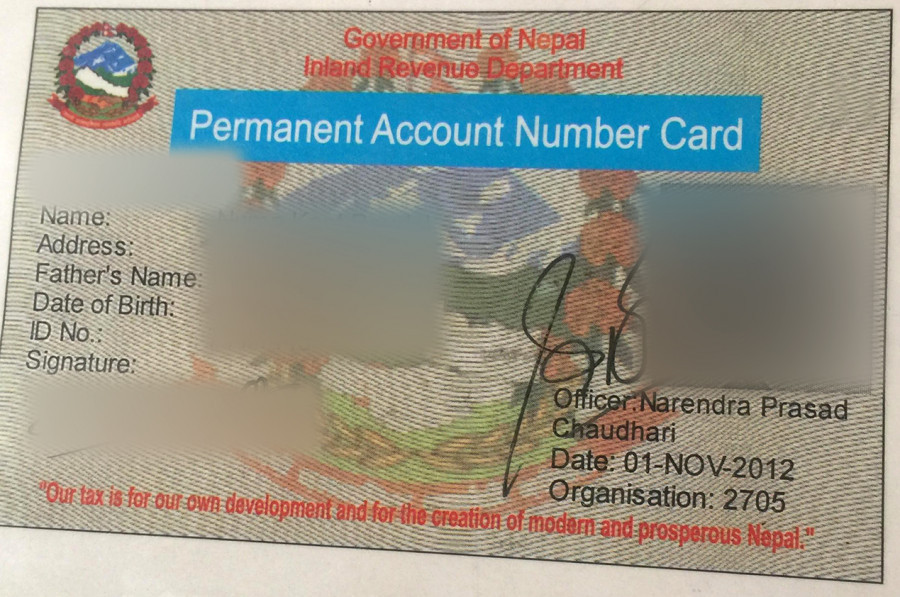Money
Fewer taxpayers obtain PAN as coronavirus bites economy
According to the Finance Ministry, 393,630 persons and firms received taxpayer identification numbers during the first six months.
Prithvi Man Shrestha
The number of taxpayers obtaining their permanent account number (PAN) fell sharply in the first half of the current fiscal year 2020-21 as the economy flatlined following the Covid-19 pandemic.
According to the Finance Ministry, 393,630 persons and firms received taxpayer identification numbers during the first six months of the fiscal year that began mid-July, a steep 59.32 percent drop year-on-year. The figure was 967,540 taxpayers during the corresponding period in the last fiscal.
Among those receiving PAN cards, individuals showed the largest drop of 67.89 percent.
The coronavirus outbreak had not spread to Nepal during the first half of the last fiscal year, and the economy was intact. But the following period was a disaster.
The government imposed a total lockdown on March 24, 2020 for nearly four months to prevent the spread of the virus; and even though most of the restrictions were subsequently removed, the economy barely stirred.
According to the ministry, the number of taxpayers registering for value added tax (VAT) and excise duty also plunged by 37.74 percent and 33.12 percent respectively in the first half of this fiscal.
The main reason behind the drop in registrations is the economic impact of Covid-19, the ministry said. “In such a situation, only those taxpayers who are compelled to register do so,” said Jhakka Acharya, director general of the Inland Revenue Department.
“People apply for PAN cards based on their need, and we don’t force anybody to do so if they don't have to pay tax. We have, however, continued our campaign to increase the number of people obtaining PAN cards.”
According to officials, the number of taxpayers receiving PAN cards this year showed a drop because it had reached a high in the last fiscal year after the government said that all those with a daily income of more than Rs2,000 had to get one.
Employees receiving regular salaries were also required to obtain PAN cards. “These provisions helped to bring a large number of people into the tax net,” said Acharya.
Except for the last fiscal year, the distribution of PAN cards in the first half of the current fiscal year was brisk compared to other years, officials said.
In fiscal 2018-19, tax authorities distributed PAN cards to 429,016 firms and individuals, according to the Inland Revenue Department.
“It is natural that the number of people receiving PAN cards decreased in the first half of this fiscal compared to the same period in the last fiscal because of the campaign to boost distribution in the last fiscal year,” said former finance secretary Shanta Raj Subedi.
“If you look at the number of people coming into the tax net in the last five years, it is impressive.”
According to him, the number of taxpayers registering with VAT in the first half of this fiscal year decreased because the turnover of many businesses sank below the VAT threshold.
The number of firms and individuals coming into the tax net has been swelling continuously in recent years. As of the first half of the current fiscal year, there were 1.5 million institutional PAN cardholders and 2.23 million personal PAN cardholders.
Officials said 279,933 taxpayers were registered with VAT and 110,031 taxpayers with excise duty.
“The number of people and firms coming into the tax net has remained good in recent years,” said Subedi. “But the government should ensure that most of them comply with the tax rules to boost revenue collection.”
According to officials, 38.46 percent of taxpayers failed to file their tax details in fiscal 2019-20, a 25.1 percent jump from fiscal 2018-19.
One of the reasons for the surge in the proportion of non-filers is the extension of the deadline for submitting VAT details and making payment because of the lockdown, they said.
But former finance secretary Subedi says the number of non-filers has remained high for the last several years.
“Only increasing the tax net will not boost revenue. The government should ensure that registered taxpayers file tax returns and pay applicable taxes,” he said.




 14.24°C Kathmandu
14.24°C Kathmandu















